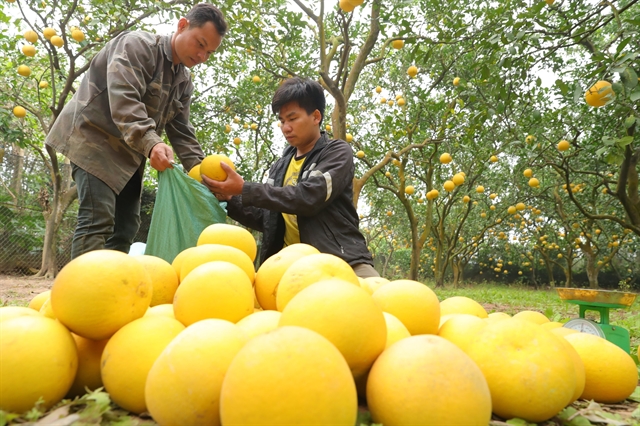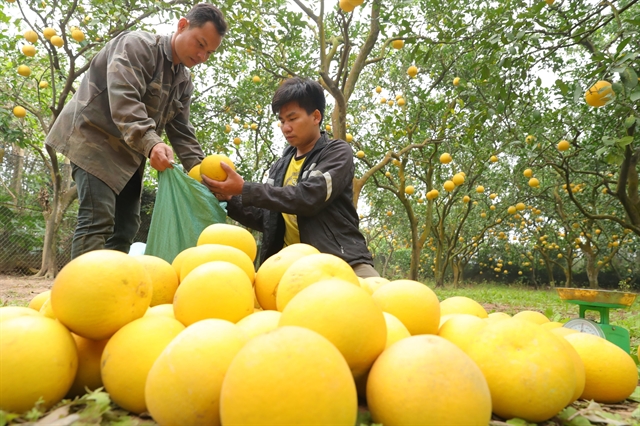 Society
Society

 |
| Harvesting pomelos in the Phú Diễn Commune of Hà Nội's Nam Từ Liêm District. — Photo courtesy of the Hà Nội Agricultural Promotion Centre |
HÀ NỘI — Hà Nội's agricultural sector has for several years focused on developing pomelo cultivation and is blessed with a special variety of the fruit.
With its inherent potential and advantages, the city is identified as a key pomelo growing region of the country.
Currently, the market demand for pomelo continues to increase. However, the export turnover of pomelo has only accounted for about 0.1 per cent of export values, to around US$1.1-1.2 billion annually.
Vũ Thị Hương, director of the Hà Nội Agricultural Promotion Centre under the Hà Nội Department of Agriculture and Rural Development, said: "Hà Nội currently has nearly 10,000ha of pomelo cultivation mainly in districts like Chương Mỹ, Phúc Thọ, Đan Phượng, Quốc Oai and Phú Xuyên.
“Hà Nội has about ten varieties of pomelo, of which the Diễn pomelo – a special variety – occupies nearly 81 per cent of the total while other varieties are also widely cultivated and bring high economic efficiency including Quế Dương pomelo, Hiệp Thuận sweet pomelo, Vân Hà pomelo, Phú Xuyên pomelo and Sài Sơn sour pomelo.”
In recent years, Hà Nội's agricultural sector has supported localities in building pomelo production models that meet VietGAP and organic standards, providing higher productivity, ensuring greater quality and potential earnings of VNĐ400-500 million ($17,000-20,000) per hectare per year.
Farmers participating in these models receive technical guidance and growing systems based on recording their cultivation activities.
Producing pomelos under VietGAP standards not only creates safe products for consumers but also contributes to the health of producers and is beneficial for the environment and can boost exports.
Chương Mỹ District has favourable conditions for fruit tree cultivation and has encouraged residents to convert low-economic-value land to fruit cultivation, mainly pomelo.
The district has collaborated with relevant agencies to organise training courses and transfer scientific and technical advances in garden renovation, pomelo grafting and production following VietGAP standards.
Lê Hữu Diện, director of Đức Hậu - Lưu Quang Clean Agricultural Co-operative in Trung Hòa Commune of Chương Mỹ District, said: "The co-operative has nearly three hectares of pomelo meeting VietGAP standards, with much higher productivity than ordinary pomelo and which is completely purchased by enterprises.
“The VietGAP pomelo is sweeter, has less pest damage, has a golden, shiny skin, fragrant flesh, juicy segments and a lovely taste."
Meanwhile, in the Sài Sơn Commune of Quốc Oai District, Phan Nhân Lợi's family previously had 400 Diễn pomelo trees, but faced difficulties in selling the harvest due to low prices.
After receiving help to switch to VietGAP standards, sales became easier and the price was about 20 per cent higher than traditional methods.
Lợi said: "To grow high-quality pomelos that meet VietGAP standards, growers need to pay attention to fertilisation techniques, operate mainly organically and use composed manure to ensure good flowering and fruiting rates."
Nguyễn Như Hảo, director of Quế Dương Safe Pomelo Production Co-operative in Hoài Đức District, believed that expanding VietGAP production models requires continuous technical training and infrastructure investment to apply mechanisation and high technology in large-scale production, build brands and establish geographical indications for local specialties.
Nguyễn Mạnh Phương, deputy director of the Hà Nội Department of Agriculture and Rural Development, said that the Ministry of Agriculture and Rural Development has approved a plan to develop key fruit trees by 2025, with a vision to 2030, choosing Hà Nội as a key area for pomelo development.
Hà Nội will continue to work with localities to select high-quality pomelo varieties suitable for each region's climate and soil conditions, strictly follow safe production processes, and ensure quality, Phương said.
The city will also expand high-tech agricultural models and link production with market access, he said.
For further development, Hà Nội plans to support localities in implementing projects in Quang Minh Commune of Mê Linh District, Xuân Đình Commune of Phúc Thọ District and Song Phượng Commune of Đan Phượng District, over a scale of 20ha.
The city aims to maintain about 70 per cent of the area for main-season pomelo varieties and 30 per cent for off-season harvesting.
In addition to traditional varieties, the agricultural sector will refine local varieties, develop new high-quality varieties and encourage businesses to invest in pomelo processing for domestic consumption and export. — VNS




